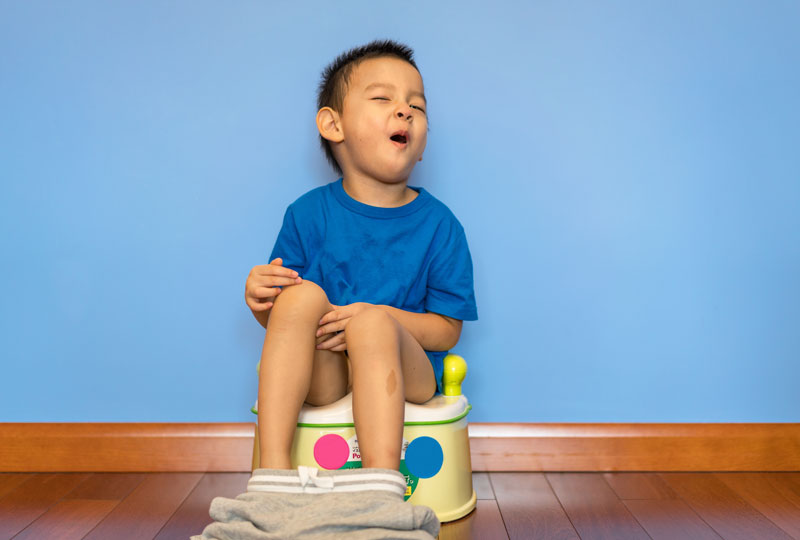Parents guide the process, but really the child is in control. How to get through potty training.
Potty training is a big milestone for young children. Mom and Dad are understandably eager to have a diaper-free child. A pediatrician at Monroe Carell Jr. Children’s Hospital at Vanderbilt, Rosemary Hunter, M.D., answers parents’ questions about how to get through this sometimes frustrating, often messy process.
Question: When should parents start potty training their child?
Answer: The child will usually show some behaviors that they’re ready to start training. There’s variation in when they’re ready. Some children are ready to start on the younger side of 2 years old. But with others, it will be later – 2-1/2, even closer to 3 years of age.
Signs that the child is ready include:
- If they can indicate when they are wet or soiled, such as wanting to be changed out of a wet diaper.
- If they understand when they’ve gone and want to be changed.
- When they can hold their urine for a period of time.
- If they wake up from a nap dry and they’ve gone a few hours without peeing, then you know that they have some control over releasing their urine.
They also usually need some communication skills – the words for needing to pee or poop, or understanding the body parts around urination and defecation. So that when you ask them questions, they can indicate when they need to go to the bathroom.
Question: Is it true that boys take longer to potty train than girls, or is that an old wives’ tale?
Answer: With any individual child, it varies a lot. But in general, boys do tend to take a little longer. We don’t know exactly why that is, other than girls do tend to be a little more advanced than boys in their communication skills.
Question: How long does potty training typically take?
Answer: If the child is showing signs of readiness and the parent is starting earlier – on the younger side of 2 — it could take longer, three to six months. But if your child is almost 3 and is a late bloomer in this area, then once he decides he wants to do it and you give the right encouragement, he might get it in a week. The older the child, the quicker they’re more likely to get it and be done with it faster. So it does vary a lot.
Question: What strategies should parents use?
Answer: We’re always offering lots of praise, lots of reinforcement when the child does it right. Stickers, a small prize or incentive of some sort – that is great. I’m also a big fan of conditional incentives. This might be an incentive such as watching a favorite video. After they’ve used the potty correctly, they can watch the video. They have to use the potty correctly again to watch the video again. It’s not a toy the child can keep; it’s access to a toy or special event they can experience when they’ve earned it, but they have to re-earn that reward.
Question: When should a parent back off from toilet training or postpone it a while?
Answer: If you find yourself getting overly stressed about it – either upset with accidents or the child getting upset with accidents, being resistant, crying, if it’s leading to a lot of distress — definitely back off. Because only the child can really control it and they have to want to do it. They can be incentivized to do it, but you can’t make them do what they don’t want to do. So most of the time we’re encouraging the softer, gentler approach, incentivizing, praising. And then if you feel like it’s causing a lot of distress or anxiety, back off.
Take a step back, figure out what potentially was the barrier or the anxiety point. For example, there are some children who pee on the potty, but they’re afraid to poop there. There are some children who won’t even sit on the potty. So if you’re at a level of resistance or anxiety where they don’t even want to sit on it, then you’ve got a long way to go. You might have to reward just sitting on it even if they don’t do anything. And then you slowly work up to a slight reward or a sticker when they sit on it. Then work up to, “If you pee in the potty, you get this other reward or this sticker.” Expect pooping to come later. They usually are continent with urine first and poop second, though children are different on that.
Question: Are there certain techniques that work with children who take a long time to get it, even after many months of age-appropriate effort? How do you close the deal?
Answer: There are two similar techniques that you can try. First, if the child is 3 or nearly 3 and not fully potty trained, you want to think about: Is the child developmentally normal? Are they delayed in some way that inhibits either their communication or their physical functioning? Or are they showing resistance to toilet training? Either they have no interest in doing it – it’s their body, they don’t want to be told when to go or what to do — or for whatever reason, the child is resisting.
If your child is developmentally normal, I would try putting the child in underwear and doing a cold-turkey approach. If they’ve worn Pull-Ups, they know how to pull them up and down, so they will know how to pull pants and underwear up and down. Put them in underwear and say, “The diapers are going to the babies who need them,” or that they’ve turned 3 and “diapers go away and we all graduate into underwear.” Keep the potty available. When the child has an accident, we remain calm, we clean up, the child helps cleaning up and getting into clean clothes – back into underwear, and you don’t ever backtrack.
When the child gets wet and soiled on a regular basis, they learn pretty quickly to get with the program and start using the potty. But you will live through some messes. You just approach those gently, help them clean up, get changed, staying in underwear and give it a week. A lot of children can just flip the switch this way. Because most children don’t like to be wet and soiled, and having to stop playing to go get cleaned up.
Occasionally a child will wet and soil and does not care. For that child, we recommend the “bare bottom weekend.” This is better done in warmer weather. You allow the child to go around the house naked from the waist down. You keep them contained in a room where accidents can be cleaned easily. And they go without pants. It can be a long weekend. Three to four days is usually what is required, at a minimum. Children do not like the feeling of peeing and pooping out in the open, with it going down their legs. It makes them more aware, and you immediately go and put them on the potty. And this is a good reinforcer of when they need to go sit on the potty.
This is all as long as the child is developmentally normal. This also an intense approach to potty training – you’re going to be in this environment until we get it to work.
Question: At what point should a parent worry that there’s a bigger problem if the child is not potty trained?
Answer: Definitely by the time the child is 4, I would consider that child either developmentally delayed or possibly that they have some severe anxiety. By age 4, you’re having an emotional/behavioral problem or a developmentally challenged child. At that point, you should talk to your pediatrician.
There’s one exception I will make in terms of what is normal. If the child can reliably stay continent with urine, in underwear, but is scared to poop on the potty, I would put him in a Pull-up to poop. Have them tell you when they need to go. Change him into a Pull-Up to poop. Clean up, put him back in underwear. They will usually outgrow that fear by age 4. So if he can say continent with urine, that’s a win. It may take more time to overcome the fear of pooping in the potty.
Question: Talk about regression – when a child who is toilet-trained goes back to having frequent accidents? Stress or changes in the family can trigger that. If you know there might be something disruptive happening in your family soon – for example, a new baby or a move – is there anything you can do to regression-proof your child?
Answer: I don’t know that there is a way to regression-proof your child. Every child is different. You’re right about the reasons that children regress. Parents should be aware that this can happen — stress or major changes in the family or routine, the new sibling, the move, divorce, yes, those kinds of things can do that. But we move forward with faith. If we luck out and they don’t regress, then yay!, but I don’t know that there’s a way to know whether a child will regress or how to prevent that.
Question: What else should parents know?
Answer: Keep in mind that you as a parent do not have any control over when your child is potty trained. You realize how little control you have over another person when you try to potty train! Only the child can do it. You can make it fun, intriguing, rewarding, make it worth their while or make them think it’s their idea to do it. Because if they think it’s just your idea, you will run into children who will resist strongly.
Also, if there are many accidents after a child has been fully potty trained, and there doesn’t seem to be a clear reason why, have your child checked out by the pediatrician. You don’t want to overlook something like a urinary tract infection or something else. Always check with your doctor if you are seeing accidents that weren’t happening before without a clear reason.

Vanderbilt’s Children’s After-Hours Clinics offer the convenience of a walk-in clinic with care provided by a board-certified pediatrician from Children’s Hospital. No appointment is necessary, but we recommend calling your pediatrician first. Learn more about services for Children’s Hospital After-Hours Clinics.

